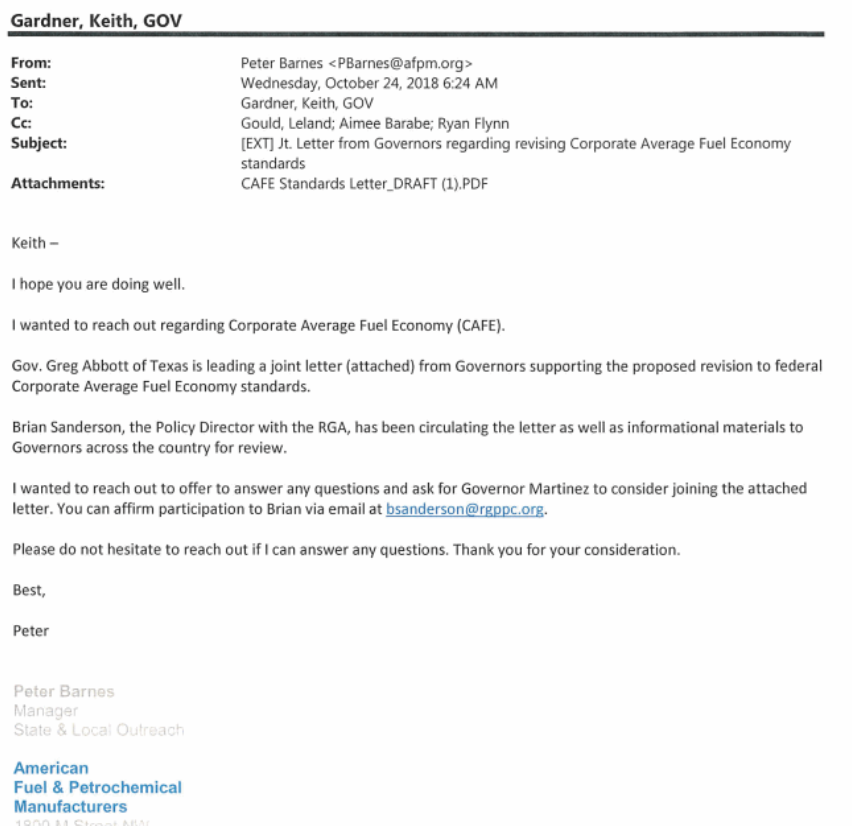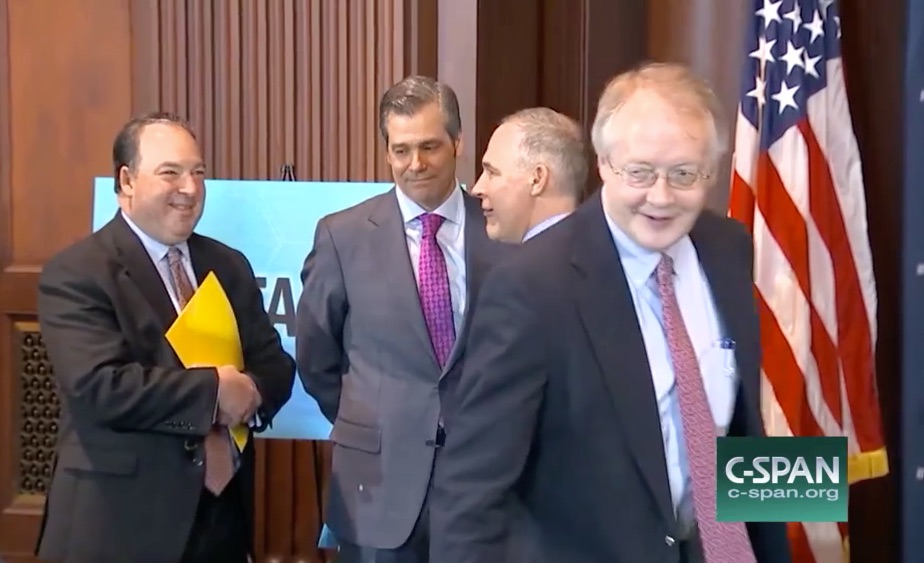As the Trump administration scrambles to formalize its rollback of clean car standards, 24 governors are telling the President to pump the brakes on the proposed rule. The governors have signed a letter, as reported this morning in The New York Times, Associated Press, and Bloomberg, requesting that the administration reconsider the rollback of fuel efficiency and emissions standards, and to honor California’s authority under the Clean Air Act to write its own standards, which other states are allowed under the law to sign onto.
As New York Times reporter Hiroko Tabuchi explains, “According to the draft statement, its 24 signatories represent 52 percent of the United States population and include two Republican governors — Charlie Baker of Massachusetts and Phil Scott of Vermont — as well as the governors of four states that voted for Mr. Trump in 2016, Montana, North Carolina, Pennsylvania and Wisconsin.”
The governors join the Alliance of Automobile Manufacturers — which warned that the proposed rules would create “untenable” instability for the industry — in asking that the U.S. Department of Transportation (DOT) and the U.S. Environmental Protection Agency (EPA) halt the proposed rollback. The letter also presents a counterpoint to an earlier letter sent by a handful of Republican governors, which was coordinated and drafted by a powerful oil industry trade group.
24 governors just told the Trump administration to stop messing with fuel economy standards. They save drivers thousands of dollars and dramatically cut carbon pollution. https://t.co/iFzEBQG7Er
— ClimateCrisis (@ClimateCrisis) July 9, 2019
A Counterpoint to Oil Industry Influence
The oil industry’s influence on this rulemaking process has been well documented, and Senator Tom Carper and Representative Frank Pallone, Jr. recently launched an investigation to determine the scope of this influence and whether lobbying efforts by the oil industry violated the laws that govern agency rulemaking. In December 2018, a bombshell investigation by The New York Times revealed a “covert social media and lobbying campaign” that was launched a year ago by groups tied to the American Fuel & Petrochemical Manufacturers (AFPM), a trade organization representing oil refiners and gasoline marketers, with close ties to Koch Industries and Koch-funded advocacy groups.
The New York Times report explained how Marathon Petroleum, the nation’s largest oil refiner, worked with AFPM and other Koch affiliates to circulate letters to Congress and agencies to lay out arguments for a more extreme rollback of the standards than even the automotive industry was seeking.
The Times also revealed how AFPM created a front group called Energy4US, deploying Facebook advertisements to prompt thousands of identical public comments filed in the Federal Register supporting the proposed rule. Researchers at DeSmog’s KochvsClean project connected the front group to more than one-quarter of all public comments that the DOT had received on the proposed rule, while also revealing that the oil industry-funded PR group Consumer Energy Alliance was connected to the campaign.
Emails obtained by the investigative watchdog group Documented revealed that AFPM was actively recruiting Republican governors to sign onto a public comment letter supporting the weaker CAFE (corporate average fuel efficiency) standards, while also “shopping around” a pre-written op-ed with language borrowed from the American Energy Alliance, a free market advocacy group run by a former Koch Industries lobbyist.
The emails from Documented clearly reveal that AFPM drafted the letter that would eventually be signed by the Republican governors, and that the group sought support while circulating it around state offices.
“AFPM and it’s member companies, which include ExxonMobil, Koch Industries, Chevron and Marathon Petroleum, have a vested interest in keeping gas guzzling vehicles on the road,” said Jamie Corey, a Senior Researcher at Documented, who uncovered the emails. “The public should know who’s pulling the strings behind-the-scenes when these Republican Governors come out in support of Trump’s plan to rollback fuel standards.”
AFPM deployed the corporate-backed Republican Governors Association (RGA) and their policy arm, the Republican Governors Public Policy Committee (RGPPC) to help circulate the letter. AFPM contributed more than $200,000 to RGA during the 2018 election cycle, according to IRS filings.
“Brian Sanderson, the Policy Director with the RGA, has been circulating the letter as well as informational materials to Governors across the country for review. I wanted to reach out to offer to answer any questions and ask for Governor Martinez to consider joining the attached letter,” AFPM’s manager of state and local outreach Peter Barnes wrote in an email to Keith Gardner, chief of staff to New Mexico Governor Martinez. Barnes wrote an identical message asking for support from Mississippi Governor Phil Bryant and others.
Eventually, governors from Texas, Kansas, Kentucky, Maine, Mississippi, Nebraska, North Dakota, and Oklahoma co-signed the letter, which was sent to the DOT and EPA on October 26, 2018, and subsequently added to the official rulemaking records.
More ‘Public’ Comments From Another Koch Group
In addition to the thousands of comments that the DOT received from AFPM’s secretive Energy4US front group, recent reporting by The New York Times identified another trove of bundled comments from an additional Koch-tied group.
Through online petitions, American Commitment, a Koch-funded and controlled advocacy organization, “generated almost 1,600 public comments in support of the rollback, or 13 percent of the 12,000 comments received and posted by the National Highway Traffic Safety Administration,” according to The Times’ Tabuchi.
American Commitment is run by Phil Kerpen, who has worked for a number of key organizations in the Koch network, including the Free Enterprise Fund, the Club for Growth, the Cato Institute, Americans for Prosperity, and Americans for Prosperity Foundation. Kerpen has recently published a handful of op-eds attacking the electric vehicle tax credit, and was one of the signatories of a 2018 letter to the Trump administration that argued for the revocation of California’s Clean Air Act waiver that allows it to set its own air quality standards. The letter, which foretold the administration’s current position in its negotiations with California, was signed by eleven groups, eight of which have clear ties to the Koch network.
The recent Times report also noted the influence of Koch-tied climate denialists during the rule revision process, showing how they pressured the administration to seek a more dramatic rollback of the standards than even the car companies were seeking.
At an April 3, 2018 announcement that the EPA would rewrite fuel efficiency standards, then-EPA Administrator Scott Pruitt shook hands with Myron Ebell of the Competitive Enterprise Institute (CEI), right, and spoke with Mitch Bainwol of the Auto Alliance and John Bozella of the Global Automakers trade group. Credit: C-SPAN
“The automakers are not going to help and may be part of the opposition,” wrote Myron Ebell of the Competitive Enterprise Institute, who also served on the EPA transition team after President Trump’s election, in a May 2018 email sent to members of the Cooler Heads Coalition and an official at the EPA. In the emails, acquired by the Sierra Club through a Freedom of Information Act request, Ebell argued to his former EPA colleague that the agency should ignore the warnings of the car companies and go forward with the rollback.
Though the Competitive Enterprise Institute doesn’t reveal its funding, the Washington Post reported that Marathon Petroleum, Koch Industries, and the AFPM are all among its donors.
Main image: Cars in Los Angeles, California. Credit: Chris Goldberg, CC BY–NC 2.0
Subscribe to our newsletter
Stay up to date with DeSmog news and alerts









